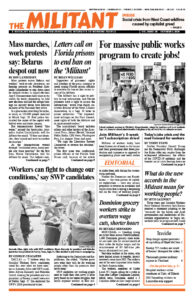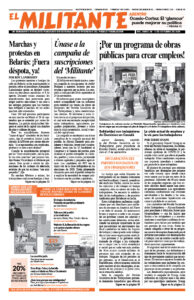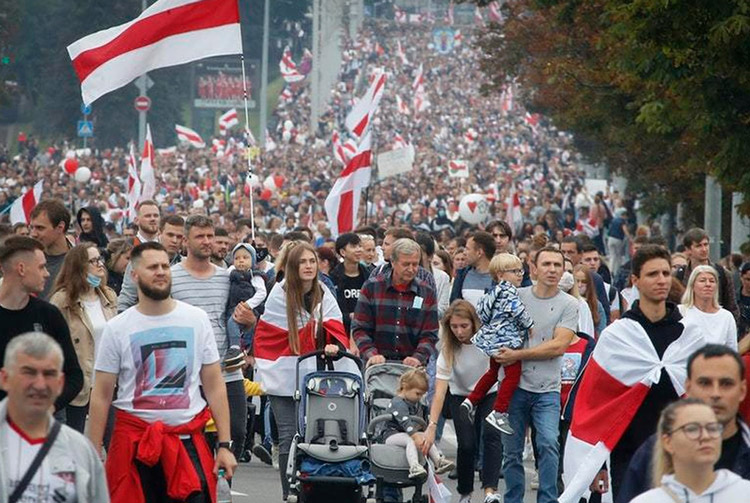Mass protests across Belarus and workers’ work-to-rule slowdowns are keeping pressure on President Alexander Lukashenko to step down since he claimed victory in rigged elections Aug 9. Demonstrators have taken to the streets for weeks demanding he hold new elections and halt the savage beatings his security forces have inflicted on many of the thousands they arrest.
In a procession stretching for miles, as many as 100,000 people marched in Minsk Sept. 20. Riot police barricaded the center of the capital with barbed wire and water cannon.
But demonstrators flowed “like water,” around the barricades, journalist Andrei Liashchynski, told the Militant by email. “If they met obstacles, they turned and went to another destination.”
As the demonstration wound through “residential areas, many people saw these marches” for the first time, Hanna Varsotskaya, told the Militant by email. This helped counter the state-run TV’s claim that the actions “are very small,” she said.
In many factories and mines workers staged strikes at the end of August, outraged at the regime’s brutal repression of protesters who were demanding Lukashenko quit. The regime pushed back, and “the most active were fired,” Yaroslav Likhachevsky, founder of the Belarusian Solidarity Fund, told Belsat TV Sept. 20.
But assembly lines across the country are now hit by what Likhachevsky called “breakdowns,” as workers look for ways to continue expressing their opposition to the regime. Repairs, he said, are always done “very slowly.”
Last week 10 people were dismissed from the Minsk Automotive Works. Afterward the plant’s assembly line broke down, Likhachevsky said.
Workers from the Khimvolokno and Azot factories joined a Sept. 13 protest march in Hrodna, Valiantsin Tseranevich, a worker at Khimvolokno, told Radio Svaboda Sept. 15. Some led the protest column in their work uniforms — a way of publicly identifying the broad support of workers for the protests — despite bosses forbidding them from doing so. Workers at Khimvolokno continue to work to rule to protest the regime’s actions, he said.
At Belaruskali, the giant potash mining and processing complex, authorities imposed 15-day prison sentences on several workers. This included Siarhei Charkasau, co-chair of the strike committee and vice president of the Belarus Independent Union, and his fellow workers, Raman Liavonchyk and Pavel Razumovskiy.
In protest, one miner chained himself to mining equipment underground, demanding an end to the state’s violence against demonstrators, the resignation of Lukashenko and of the director of the Belaruskali enterprise, as well as the release of the strike committee members. Production was halted for hours until police went down the mine to cut the shackles and remove him. Other miners rallied to support him as he came out.
Tractor factory strike leader freed
The head of the strike committee at the Minsk Tractor Works, Siarhei Dyleuski, was among those released after a 25-day detention. He was welcomed by families and supporters Sept. 18. The plant employs over 15,000 workers. Dyleuski is a member of the Coordination Council set up by presidential candidate Svetlana Tikhanovskaya, who is widely recognized as the real winner of the August elections. Most of the council’s leading members are detained or in exile.
Lukashenko has ruled Belarus with increasing repression since winning the country’s first presidential election in 1994. The country became independent when the Soviet Union broke apart three years earlier.
During much of his 26-year rule Lukashenko sought to play off the European imperialist powers seeking influence in Belarus against Russia’s capitalist rulers who hold sway there. Now he has been forced to turn decisively to Russian President Vladimir Putin to help maintain his widely hated government.
Moscow’s goal is to counter the expansion of the Washington-led NATO alliance in Eastern Europe. Russian troops are deployed at two military bases in Belarus.
The Kremlin backs the Belarusian autocrat to protect the interests of Russian capital. Over a fifth of the $1.5 billion loan recently extended by Moscow to Minsk is to cover the outstanding debt owed to Russian gas giant Gazprom.
Much of the rest of Moscow’s financial support is aimed at bolstering the state apparatus Lukashenko depends on to cling to power.
Both Putin and Lukashenko allege the protests in Belarus are a result of western imperialist interference, not the persistence of hundreds of thousands determined to get the regime off their backs and defend their political rights.


